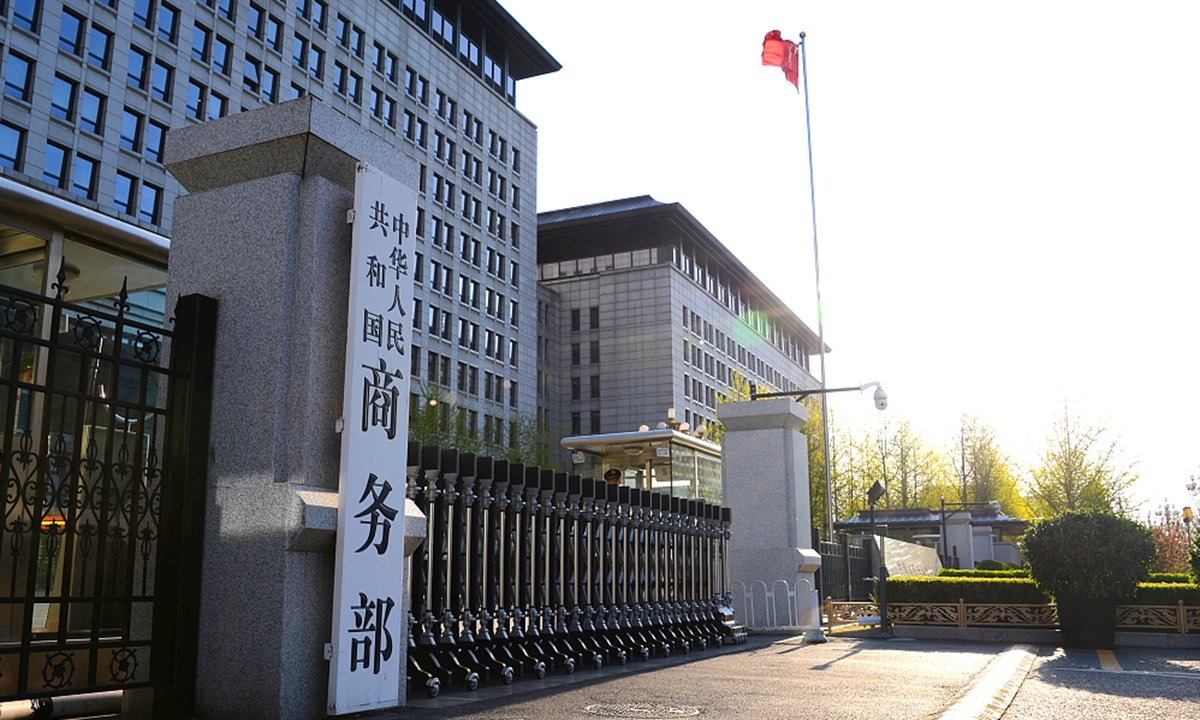
The Ministry of Commerce Photo: VCG
China's Ministry of Commerce (MOFCOM) on Tuesday announced decisive measures against Canada, including plans to initiate dispute settlement proceedings at the WTO and launch an anti-discriminatory probe, after Canada's decision to impose hefty additional tariffs on Chinese products, including electric vehicles (EVs), steel and aluminum.
Chinese experts said that the measures are in line with Chinese laws and regulations as well as WTO rules, and slammed that Canada's move, in lockstep with the US and the EU, is egregious in nature and violates WTO rules.
Among the measures is a decision to initiate dispute settlement proceedings against Canada's additional tariffs against Chinese EVs and other products at the WTO to safeguard the interests of Chinese industries.
In addition, China will launch an anti-discriminatory investigation into Canada's decision of imposing additional tariffs on Chinese EVs, steel and aluminum, based on the Article 7 and Article 36 of China's Foreign Trade Law.
The Article 7 of China's Foreign Trade Law clearly stipulates that in the event that any country or region applies prohibitive, restrictive or other like measures on a discriminatory basis against China in respect of trade, China may, as the case may be, take measures against the country or region in question.
The Article 36 of China's Foreign Trade Law states that the authority responsible for foreign trade under the State Council may conduct investigation with regard to relevant matters, including the matter that requires investigation for implementing Article 7.
The MOFCOM said that it will take subsequent measures based on the actual situation. Industry insiders said that the anti-discriminatory probe is the first of its kind, and is in line with both Chinese laws and WTO rules.
Also on Tuesday, the MOFCOM announced that China will launch an anti-dumping investigation into canola seeds imported from Canada, in responding to industry concerns and in order to safeguard the legitimate rights and interests of the domestic enterprises.
In 2023, Canada's exports of canola seeds to China reached $3.47 billion, increasing 170 percent year-on-year, even as prices continuously dropped, according to the MOFCOM. Affected by Canada's unfair competition, Chinese domestic industries continue to suffer losses, the ministry said.
In addition, China also plans to launch an anti-dumping probe into relevant chemical products from Canada, the MOFCOM announced.
"China's attitude is very clear and it will take all necessary measures to defend the legitimate rights and interests of Chinese companies," the MOFCOM said, while announcing the measures.
Unlike Canada's move that is politically motivated and out of the WTO framework, the measures taken by the Chinese side are made in response to the industry requests and concerns and are based on WTO rules as well as with clear reference from corresponding laws and regulations of China, experts said.
The measures came after Canada, following the lead of the US and the EU, said on August 26 that it would impose a 100 percent tariff on imports of Chinese EVs. The country also announced a 25 percent tariff on imported steel and aluminum from China, according to media reports.
Canada's protectionist move has caused concern in the industry for its foreseeable disruption to the supply chain and businesses involved, including foreign companies such as Tesla.
While Canada's actions were reportedly aimed at
Chinese EV makers, the volume of Chinese EV exports to Canada were relatively small until Tesla started to ship its Shanghai-made EVs to Canada in 2023. The value of Chinese EV exports to Canada rose to C$2.2 billion ($1.6 billion) in 2023, compared to C$100 million in 2022, according to media reports.
Canada's move has drawn harsh criticism from Chinese officials, who vowed to take all necessary measures to safeguard the legitimate rights and interests of Chinese enterprises.
Experts said that Canada's move is politically motivated, as it follows the step of similar additional tariffs against Chinese EVs announced by the US and the EU.
The China Iron and Steel Association recently noted that the Canadian government's unilateral decision to impose tariffs on Chinese steel products without any investigation undermines the multilateral trading system based on WTO rules and has adverse impact on global steel trade and industry development.




